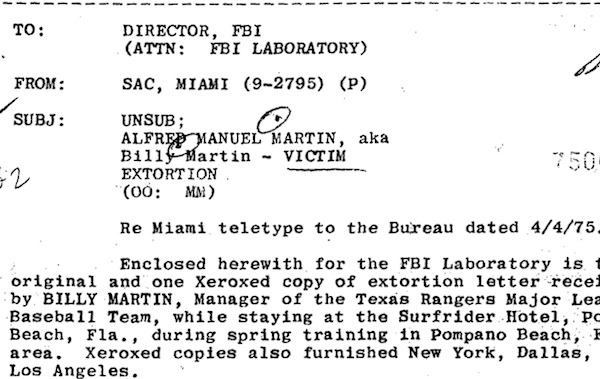
Photo by: FBI
An image from former Yankees manager Billy Martin’s FBI file.
The Freedom of Information Law allows the public to access many government documents. With the exception of documents that fall under specific exemptions to the law—generally designed to avoid harming individuals or preventing a government agency from completing its duties—all government agencies are required to provide documents when requested.
The Freedom of Information Law (or FOIL) only applies to government documents. Private companies and organizations are not required to respond to document requests.
The law also only applies to documents, so government agencies are not required to provide information that is not included in existing documents. However, the New York State Open Meetings Law grants you the right to attend meetings of public bodies, including city councils, town boards and school boards. The law also requires that minutes of meetings are made available within two weeks of a meeting.
The Freedom of Information Law is outlined for New York City and State agencies in article 6 of the Public Officers Law. Federal Agencies are under the jurisdiction of the Freedom of Information Act.
City and state agencies are increasingly placing information that once required a FOIL request on their website. Before you initiate a formal FOIL request, you should prowl the agency’s site to see what is there for the taking.
If you do wish to make a request, you must write a letter or e-mail to the records access officer of the agency that maintains the documents you want. Your letter must explain what documents you need. Unless you are requesting a list of names and addresses, you are not required to provide a reason for your request. Some agencies will have you submit a specific form instead of writing a letter.
In your request, be sure to give a detailed description of the documents needed. Agencies can reject requests that do not reasonably describe documents. If a request is too vague, then agencies are required to seek clarification. To help provide a more specific request, you may consider contacting the agency to learn how they keep their records.
The New York department of State Committee on Open Government provides a sample request letter. The Committee is responsible for providing the public with information on how to use the Freedom of Information Law, the Open Meetings Law and the Personal Privacy Protection Law. The Committee can provide you with any assistance you may need with any of these laws.
Under the law governing FOIL requests in New York state, after your request has been received, it must either be granted or denied within five business days. If additional time is needed to access the document, then the agency must notify you within that time frame. If the agency you’ve requested documents from does not respond within five business days, then it constitutes a denial.
If the agency denies your request, then you have the option of filing an appeal. Appeals must be submitted within 30 days of the denial. Appeals can be made to the chief executive of the agency. The Freedom of Information Law requires that appeals receive a response within 10 business days.
If an appeal is denied, then the agency must provide you with a written explanation of why the appeal was denied. If an appeal is denied or you do not receive a response, then you can initiate a proceeding to challenge the denial under article 78 of the Civil Practice Law and Rules. An article 78 can be filed with the Supreme Court in the county where the agency is based.
When providing a document, agencies reserve the right to make redactions. Any information they believe isn’t protected by the Freedom of Information Law can be blocked out of the document. If you believe the redactions were unnecessary, then you can appeal them through the same process as appealing a denial.
If your request is approved, then you may be required to pay for the reproduction of the documents. For paper copies of documents the agency can charge up to $0.25 per page. For electronic copies, there is usually no charge, but if it takes the agency more than two hours to prepare the documents, then you may be charged for an employees time.
The following is a list of links and contacts for commonly requested agencies:
New York City agencies
Department of Health and Mental Hygiene
Department of Housing Preservation and Development
Economic Development Corporation
Fire Department: Record Access Officer, FDNY Bureau of Legal Affairs/CDLS Unit, 9 MetroTech Center, 4th Floor, Brooklyn, New York 11201-3857
Department of Environmental Protection
State agencies/authorities
Department of Corrections and Community Supervision
Federal agencies
White House: Dionne Hardy, FOIA Officer, Office of Management and Budget, 725 17th Street NW, Room 9026, Washington, DC 20503









2 thoughts on “How to Use the Freedom of Information Law”
If my FOIL records produces a ‘no records’ response, which constitutes a denial, am I required to file an appeal before I sue or file a petition in the courts, or do the courts require that an appeal be filed first?
Bill: I’m no lawyer but I have always operated under the assumption that you have to exhaust all avenues with the agency before filing a suit. If I were you, I’d appeal. I have had success with an appeal in the past; you never know.